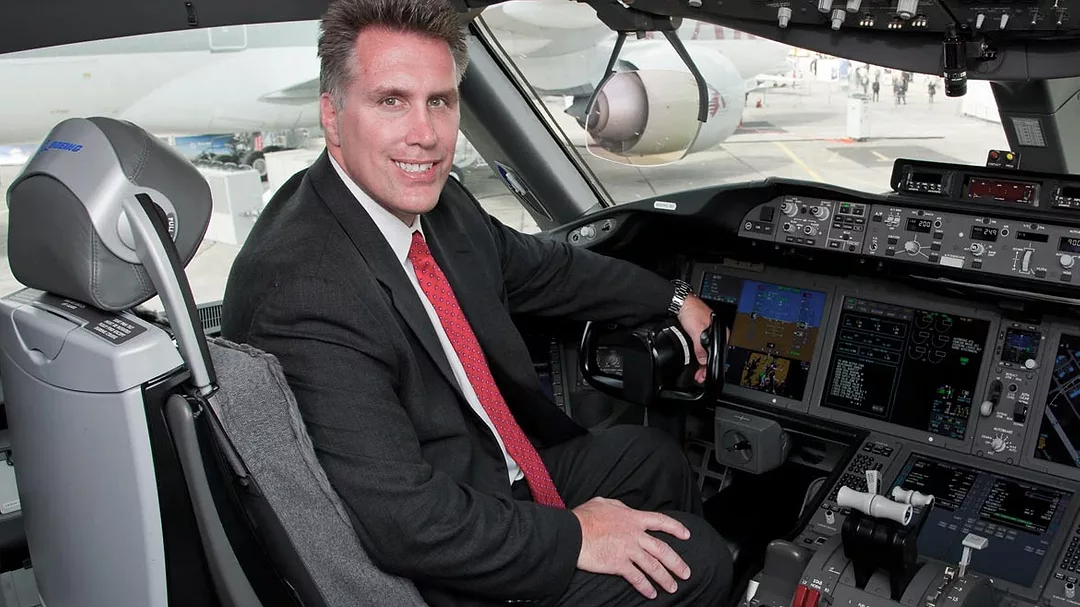Leadership
Security leadership profile: Dave Komendat takes a broader perspective
As Dave Komendat, Vice President and Chief Security Officer at Boeing, prepares to retire this year, he reflects on formative moments that affected him and the lessons he’ll take with him into the next chapter of his career.

Images courtesy of Komendat

Images courtesy of Komendat
A little more than halfway through his career, Dave Komendat, Vice President and Chief Security Officer (CSO) at The Boeing Company (Boeing), had an interaction with a senior company leader that, in his words, set him back in his career.
“I did not realize at the time the implication of this interaction. It was a situation where you had two frustrated people talking at each other and neither one listening. In my case, as the junior person, I should have been in listening mode, but instead, I was focused on trying to win,” he reflects. The situation, he says, pushed him to look at himself and evaluate what kind of leader he wanted to be. “It was a huge negative at the time,” he says, “but ultimately it turned out to be a huge positive because it forced me to be introspective, and I learned that sometimes you need to stop talking and just listen.”
Komendat looks back on that moment as an important learning experience for him personally. Of course, any executive leaders that have been in their careers long enough will have these moments, both positive and negative, that will shape their career and the type of leader they want to be and are. And, the truth is, that’s not Komendat’s only formative moment, nor was it his first one.
In fact, there have been many impactful moments throughout his 36-year career as a security professional — the last 14 of those years spent as the senior-most security leader at Boeing — a leading aerospace company that develops, manufactures and services commercial airplanes, defense products and space systems for customers in over 150 countries. The CSO position oversees one of the industry’s largest and most complex security functions, and Komendat has navigated the company through countless natural disasters, international conflicts, terrorist events and the COVID-19 pandemic.
You could say Komendat’s very first impactful moment as a security leader started with a knee injury. While playing football in his second year of college at California State University’s Long Beach campus, Komendat suffered an injury. An injured knee meant an additional year of undergraduate work added to his educational timeline, but it was also an opportunity to take a hard look at his future path. A business marketing major at the time, Komendat wasn’t particularly passionate about his classes, he says. He decided to take a semester exploring subjects outside of his major and look into alternative possibilities.
“I took a few classes in psychology and criminal justice, and I was energized by the instructors and the content,” he says. Komendat switched his major to industrial security (one of a couple of tracks within criminal justice at the time) and began pursuing a degree focused on working for defense contractors, supporting security and classified programs.
An internship in 1986 led him to Douglas Aircraft Company, a subsidiary of McDonnell Douglas, which later merged with Boeing in 1997. After that first summer, Komendat was brought on full-time as an entry-level industrial security rep, conducting security education briefings and working on security clearances.
He stayed with the company (minus one year when he tried his hand at working for a venture capitalist — big mistake, Komendat says) through acquisitions and mergers, promotions and different assignments, running through almost every function within security as well as being exposed to adjacent ones, such as IT, strategy and environment, health and safety (EHS).
During those earlier years, one assignment in particular stands out for Komendat — he calls it one of the best assignments of his career — when he was working as a site security manager at the U.S. Sea Launch in Long Beach Harbor, launching satellites off of a refurbished oil drilling platform.
“It was one of those jobs where you did everything. You might have had a title, but you still had to sweep the parking lot before the launch party or chip in on whatever needed to be done,” he says. “It has been jobs like that throughout my career that have kept me grounded. The lessons I learned in those early years were foundational lessons that would certainly carry me through the next couple of decades. Each and every job was hard and complicated and, as I progressed, I tried to never forget what it takes to make a security organization at every level of the business.”
Komendat’s varied exposures and experiences in his early career enabled him to take a broader, more informed approach to decision-making and have afforded him the ability to speak the language of other functions, forge collaborations with other groups, and build a security program that crosses departmental roles and responsibilities to protect the company and its assets. In addition to his day job, Komendat has been a supporter, member and leader within many industry organizations throughout his career, including the Overseas Security Advisory Council (OSAC), Domestic Security Alliance Council (DSAC), International Security Management Association (ISMA), Hostage US, Domestic Security Partnership (DSP), International Security Foundation (ISF) and Security Executive Council (SEC).
All of these experiences combined prepared Komendat to become CSO of Boeing in 2008. The organization elevated the role to VP in 2010 for the first time in the company’s history, and Komendat focused on treating the security function like any other business: proving its value, maturing the organization, and expanding roles and responsibilities.
“When I started in this industry, the primary concern was physical security and a ‘guards and hoses’ approach. Over the past three decades, the threat landscape has become so complex. Programs that weren’t needed in the 80s, such as supply chain, intelligence programs, security operations centers, are now necessities — so it’s almost like night and day,” Komendat says. “But all those opportunities and organizations that I have been a part of have given me a perspective and ability to adapt. The breadth of exposure in and outside of Boeing has helped me grow and develop, and that’s certainly been one of the greatest things for me personally in my career.”
It was some of those long-standing relationships that Komendat built during his tenure that helped him embark on a journey a little over a decade ago to prove the security function’s value to Boeing leadership through metrics and data in a big way — boosting the maturity of the organization and elevating its posture within the company.
“I think every security leader goes through a point in their career where the question of value comes up. How valuable are you or aren’t you?” Komendat says. “We’ve always had support from the organization, but we were in the situation of reconsolidating the company and we needed to build the business case as to why [security] made sense. I felt like we needed to be able to tell a more compelling story and also figure out where our gaps were.”
With networking and the help of the SEC, Komendat and his team set about collecting the types of metrics and data that would be meaningful to the security function, as well as to the greater organization, including security as a percent of total revenue, the value of pre-employment screening, costs avoided with the insider threat program, fire and medical response times, and many more.
“We focused on creating simple to read, informative value metrics and charts where we can go in, talk about the investment of any particular program and what the company got in return in terms of cost avoidance, time savings, reduced insurance, and others,” he says. “In the beginning, anytime I was given an opportunity to speak with our executive team, I always worked those metrics into the discussion. It created a lot of interest, and they started to realize that our leadership team was trying to run security as any other business within Boeing. We started to see more seats at the table.”
Another big accomplishment that stands out for Komendat and further solidified the value of Boeing’s security function was the creation of the Mesa, Arizona global security operations center (GSOC) in 2017. Prior to the centralized GSOC, the organization had, over the years, acquired a number of communications centers with disparate technologies through mergers and organizational changes. “We didn’t have any interconnectivity, and we were spending a lot of money capitalizing on all of the individual locations,” Komendat says. And so, Komendat and his team embarked on a journey to convince the organization that consolidating these disparate centers was an investment that would pay off in the end. It was no easy task, however, as such a move would initially eliminate and consolidate positions and roles. But, after about a year of discussions, Komendat says that key company stakeholders, including the CEO, were on board with such a move that would ultimately be a worthwhile and meaningful investment.
“It was a really big deal to have that kind of visibility and broad capabilities in one place. To be able to integrate these centers and provide such a high level of support to all aspects of the company — that’s definitely been a highlight in my career. It’s one of those legacy events that don’t come around more than once,” Komendat says.
Aside from accomplishments and marked events that will stay with Komendat into the next chapter of his personal and professional journey, he will bring with him a number of leadership lessons. First and foremost, he says, “there is no secret sauce to being a business leader and to do it well. If you can put your mind to it and take chances, take experiences — even if they are outside of security — those will broaden your outlook and make you a better leader in the end.”
For Komendat, the biggest leadership lessons he has learned are honesty, transparency, listening and knowing his strengths and weaknesses. And like everything else in his career, Komendat believes those come with time, experience and practice. “I wasn’t born a VP, I worked my way up, and the longer I’ve done it, it has become clearer to me that it’s simple things that make a good leader: being honest, being respectful, listening to those around you and being available,” he says.
By identifying strengths and weaknesses, Komendat says security leaders can build their teams to fill in those gaps. “I’m a very red leader and I will make a decision quickly, so I need to have people who sometimes slow me down and weigh the options. You also learn so much more when you shut your mouth and give everyone an opportunity to speak and be heard,” he says. “It’s an acquired skill that I had to learn and still have to remind myself sometimes, but what you gain from that is invaluable.”
Though Komendat is preparing to hang up his hat as VP and CSO of Boeing in September 2022, he’s not retiring from the security industry, which he’s contributed to and learned so much from over the years. “I’ll continue to do some of the nonprofit work I’m involved in, and it’s my plan to continue to be involved, engaged and visible in the community,” he says. “I’ve always been fascinated by this world and everything going on around us. Security is an industry that’s on the cutting edge of what’s significant to each business, and I’m incredibly proud to be a part of it. Really, I mean, how cool of a job is that.”
Looking for a reprint of this article?
From high-res PDFs to custom plaques, order your copy today!








